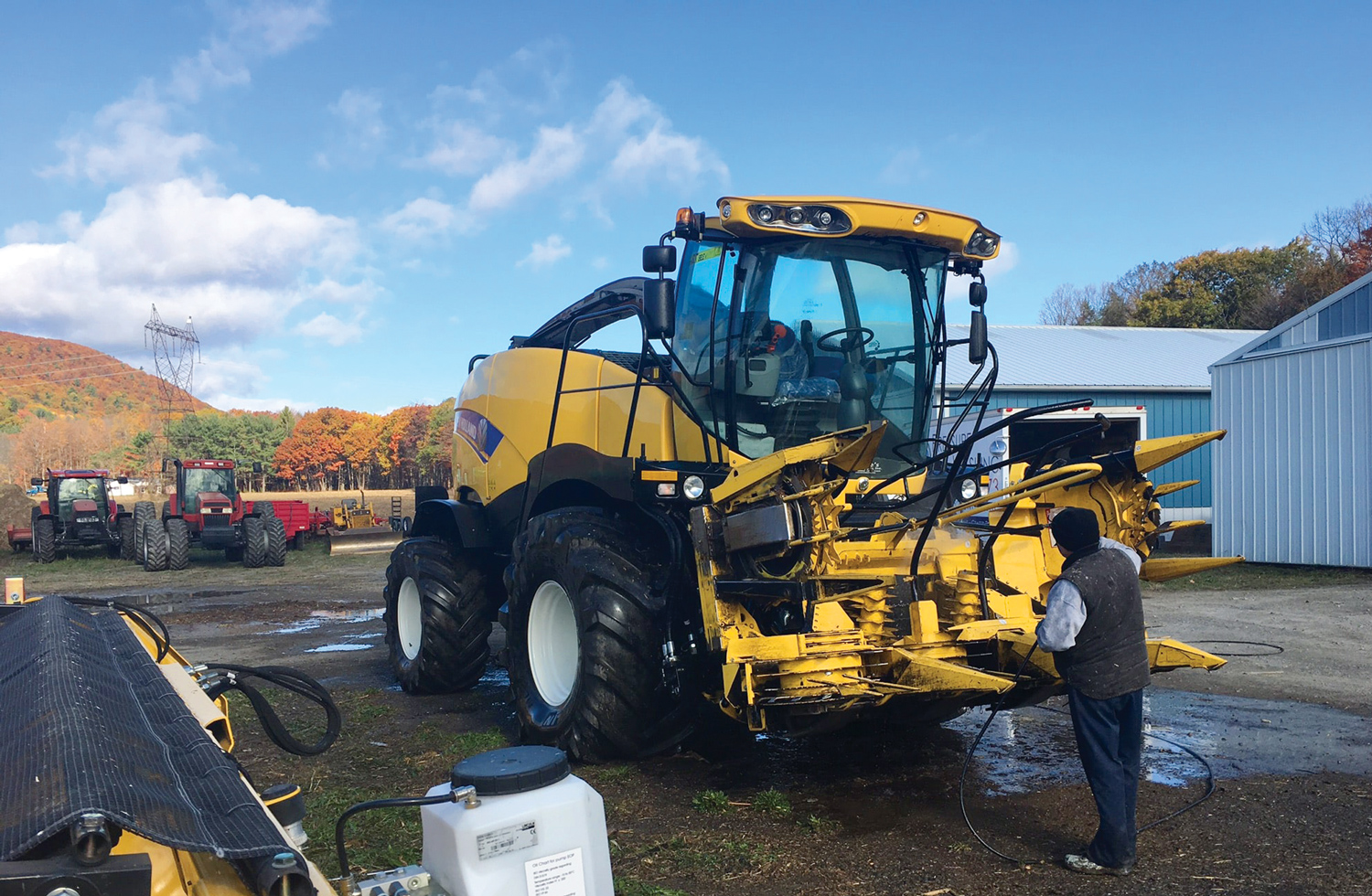Why it is important to keep your equipment clean
August 2025
VALERIE CILLIERS,
PULA CONTRIBUTOR |
 |
RECENT OUTBREAKS OF DISEASES SUCH AS FOOT-AND-MOUTH DISEASE IN CATTLE, BIRD FLU IN POULTRY AND GOSS’S WILT IN MAIZE HAVE REMINDED FARMERS HOW IMPORTANT STRONG BIOSECURITY MEASURES ARE FOR SOUTH AFRICAN FARMS. THESE DISEASES DO NOT JUST HURT FARMERS’ POCKETS – THEY ALSO PUT THE COUNTRY’S FOOD SUPPLY AND EXPORT OPPORTUNITIES AT RISK.
Considering that a disease outbreak could destroy an entire harvest or wipe out a herd, it is easy to see why good biosecurity practices have become a farmer’s first and most important line of defence.
MACHINERY AND EQUIPMENT
One simple but essential way farmers can protect their farms is by regularly cleaning machinery and equipment. Why? When soil, plant rests or manure sticks to tractors, ploughs, harvesters or even shovels, it can carry harmful germs, pests and weed seeds. By keeping equipment clean, farmers can avoid spreading these problems to their own fields or their neighbours’ farms.
According to Morné le Roux, a new business development and technical consultant at Ecowise, farms must have a proper daily cleaning and disinfection programme as part of their biosecurity plan. ‘Implementing a formal terminal clean-out programme and using approved cleaning and disinfecting chemicals after every production day is vital for biosecurity on farms,’ Le Roux explains.
He adds that farms should also have a pre-requisite programme (PRP) and a complete hazard analysis and critical control points (HACCP) plan as part of their biosecurity programme. These plans help to control risks and keep the production environment safe. Farmers can get help and advice from their veterinarians or suppliers regarding these programmes and plans.
According to Le Roux, daily cleaning and disinfection tasks should include the following:
- All vehicles must be disinfected before entering the farm.
- Staff and visitors must use showers, hand sanitisers, surface sanitisers and foot baths, as well as disinfect their boots, before entering the farm.
- Places such as poultry houses, pig farms, dairies and packhouses must be cleaned and disinfected, including all surfaces that touch food.
- All equipment must be washed and disinfected on the outside. On the inside, pipes and systems with rectangular shapes (for example, dairy equipment) should be cleaned using approved cleaning-in-place (CIP) chemicals that circulate inside to clean and sanitise.
- Feed silos and storage areas must be cleaned and disinfected when they are empty and not in use.
- With any disease outbreak, farmers could apply aerial disinfection or fumigation to help control the disease.
Le Roux stresses that these steps are essential to protect animals, people and the farm business.

Reasons why clean machinery matters
- Diseases such as Sclerotinia on sunflower and Goss’s wilt, which
- affects maize, can spread through contaminated equipment. If you borrow a tractor from a neighbour whose field is infected, the soil or plant material on its tyres could bring the disease to your farm. Regular cleaning ensures that your machinery does not spread diseases.
- Clean equipment reduces the risk of introducing pests or weeds that compete with your crops or harm your livestock. For example, gerbils thrive in areas with abundant food sources such as seeds or crop residues. If machinery is not cleaned, it can spread weed seeds or leftover grains across fields, providing food and a habitat for this critical pest that can reduce a grain harvest by up to 70%. Weed seeds carried on equipment can also reduce yields when these seeds sprout and compete for nutrients and water.
- South Africa’s agricultural exports depend on meeting strict international biosecurity standards. If your crops become contaminated, they may fail to meet maximum residue limits or be rejected due to pest or disease presence.
- Preventing disease outbreaks through clean machinery is far cheaper than managing an outbreak. Treating infected crops or livestock, replacing lost yields or dealing with quarantine measures can strain your resources.
- As a farmer, you are part of a broader agricultural community. Poor biosecurity on your farm could spread diseases to neighbouring farms, damaging relationships and the local economy. Clean machinery helps you contribute to a safer community.
PRACTICAL STEPS TO KEEP MACHINERY AND EQUIPMENT CLEAN
There are practical, cost-effective ways to maintain clean machinery and enhance biosecurity on your farm. A recent article in SA Graan/Grain named ‘Key guidelines for on-farm biosecurity’, written by Dr Lavinia Kisten, research coordinator at Grain SA, provides some of the following guidelines:
- Designate a parking area: Direct all visitors to park in a monitored area away from production zones. Input suppliers and technicians visiting the farm should preferably utilise on-farm vehicles rather than their own to prevent contamination across other farms.
- Set up a wash-down area: Create a designated area for cleaning machinery, ideally away from production zones, to prevent recontamination. If water is scarce, a simple gravel or concrete pad where you can sweep off debris can work. Use a high-pressure hose or broom to remove soil, plant material and manure from tyres, undercarriages and blades. Do not forget also to wash small tools, such as spades.
- Disinfect after cleaning: After removing debris, disinfect your equipment to kill any remaining pathogens. A cost-effective solution is a 1:10 bleach-to-water mix (one part bleach to ten parts water), which can be applied with a sprayer or cloth. Focus on high-risk areas such as tyres and cutting surfaces. Leave equipment in the sun after cleaning, as sunlight can help to kill some pathogens.
- Clean before and after use: Always clean machinery before entering your fields, especially if it is borrowed or shared. Similarly, clean it after working in a field, particularly if you suspect pests or diseases. This prevents cross-contamination between fields or farms.
- Monitor and maintain equipment: Regularly inspect your machinery for wear and tear, as damaged surfaces can hide pathogens. Simple maintenance, such as greasing moving parts or patching cracks, can improve cleaning effectiveness and extend equipment life.
- Train yourself and your workers: Educate yourself and your workers about the importance of clean equipment. Display a simple biosecurity checklist near your wash-down area to remind everyone of cleaning protocols.
- Use digital tools: Apps such as Biosecurity Africa, developed by Cropwatch Africa, allow you to report and monitor pest and disease outbreaks in your area. This knowledge can help you to decide when to intensify cleaning efforts, especially if a nearby farm reports an outbreak. Download the app in the Play Store for Android phones or the App Store for IOS phones.
OVERCOMING CHALLENGES
Limited access to water, disinfectants or cleaning facilities can make biosecurity challenging. However, you can adapt by using dry cleaning methods (brushing off debris), pooling resources with neighbours to buy disinfectants in bulk or seeking support from agribusinesses or government programmes.
Financial constraints may also discourage investment in biosecurity. However, the cost of cleaning is minimal compared to the potential losses from a disease outbreak. Start small, focussing on one or two key machines and gradually building your biosecurity system as your farm grows.
CONCLUSION
South African farmers are not just farming for today but building a legacy for future generations. By prioritising biosecurity through clean machinery, farmers position their farms to seize future opportunities, whether supplying local markets or exporting to global buyers.
Good biosecurity practices also support the bigger goal of sustainable farming, which is vital, as farmers face challenges such as soil damage, water shortages and climate change. By controlling pests and diseases, farmers help protect the environment and play their part in building a stronger, more reliable food system for everyone.
Keeping machinery and equipment clean is a simple yet powerful biosecurity practice that can protect farms, livelihoods and communities.
Publication: August 2025
Section: Pula/Imvula

